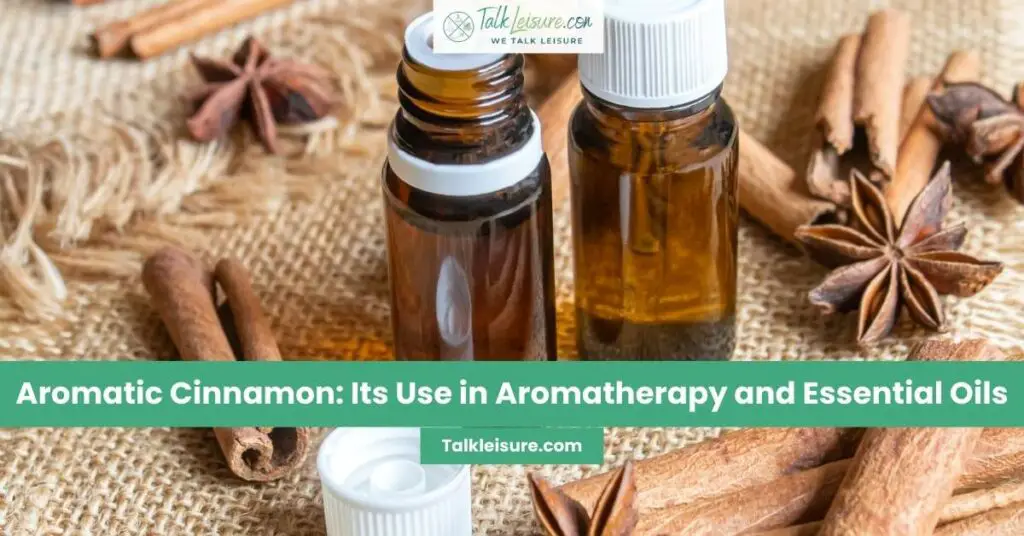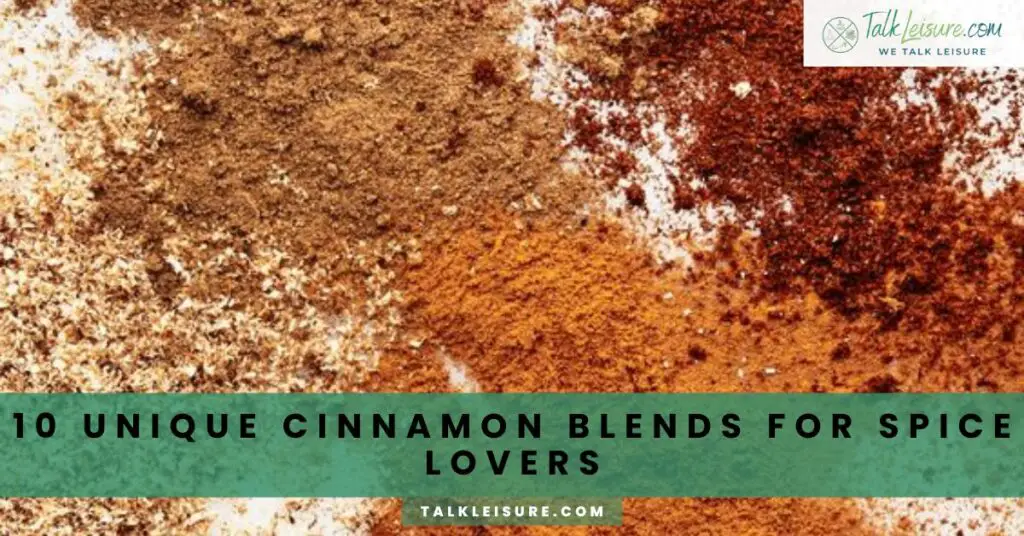Cinnamon has long been valued for its taste as well as its medicinal qualities.
It is an ancient spice that is appreciated for its potent aroma and numerous culinary uses.
Since it can be extracted into essential oils and used in aromatherapy, cosmetics, and other health-related businesses, cinnamon bark oil is a powerful and versatile component of overall wellness.
This article explores the complex realm of cinnamon bark essential oil, revealing its numerous advantages, a wide range of uses, historical significance, and safe usage guidelines.
Through a comprehensive exploration of its properties and applications, readers will gain valuable insights into harnessing the potential of this aromatic treasure.
Join us on an aromatic journey as we navigate the captivating realm of cinnamon bark essential oil, uncovering its benefits, understanding its uses, and exploring its diverse applications in aromatherapy, skincare, holistic health, and beyond.
What Is Cinnamon Oil?
Cinnamon, a spice obtained from the inner bark of trees belonging to the Cinnamomum family, is known for its sweet aroma and unique taste.
Cinnamon has been used for centuries in various cuisines and as a medicinal herb.
With the advancement of technology, cinnamon oil is now extracted from the bark and used in a wide range of products, from perfumes to food flavoring.
Cinnamon oil is extracted from the bark of the cinnamon tree and is known for its spicy and warm fragrance.
It is widely used in aromatherapy due to its relaxing and comforting effect on the mind and body.
Cinnamon Is a Popular Aromatic Spice
Cinnamon is one of the most popular aromatic spices in the world and is used in various cuisines.
It is commonly used in baking, hot beverages, and savory dishes.
Cinnamon not only adds depth and flavor to the dishes but also helps to regulate blood sugar levels.
It is also a natural preservative that can extend the shelf life of food products.
What Are The Chemical Properties of Cinnamon Essential Oil?
The main chemical components present in cinnamon essential oil are cinnamaldehyde, eugenol, and linalool.
Cinnamaldehyde is known for its anti-inflammatory and antimicrobial properties, while Eugenol offers analgesic properties.
What Are The Therapeutic Benefits of Cinnamon?
Due to its chemical components, cinnamon essential oil offers various therapeutic benefits.
It may help to lower blood sugar levels, aid digestion, and relieve muscle pain and cramps.
Additionally, it has antioxidant properties that help protect against free radical damage.
How to Use Cinnamon Essential Oil in Aromatherapy?
Cinnamon essential oil can be used topically or diffused for aromatherapy.
It is recommended to dilute the oil with a carrier oil before topical application.
Moreover, adding a few drops of cinnamon essential oil to bath water can help in relaxing sore muscles and muscle tension.
Diffuser Blends with Cinnamon Essential Oil
Cinnamon essential oil can be blended with lavender, lemon, peppermint, or wild orange for diffusing.
This blend helps improve mood, promote relaxation, and reduce stress and anxiety levels.
Overall, cinnamon essential oil is a versatile ingredient that offers both aromatic and therapeutic benefits.
Using it in aromatherapy can be an excellent way to incorporate this wonderful oil into an everyday self-care routine.
What Are The Benefits of Cinnamon Essential Oil?

Cinnamon essential oil has a unique spicy and warm aroma that makes it popular in the world of aromatherapy.
This oil is extracted from the bark of cinnamon trees and contains cinnamaldehyde, eugenol, and linalool, which are the primary chemical components that offer therapeutic benefits such as anti-inflammatory properties, analgesic properties, and antioxidant properties.
Supporting the Immune System with Cinnamon Essential Oil
Cinnamon essential oil may help support the immune system due to its antibacterial, antiviral, and antifungal properties.
It may help provide protection against various infections and diseases.
Cinnamon Essential Oil for Skin Care and Hair Care
Cinnamon essential oil can be beneficial for the skin and hair.
Its antifungal and antibacterial properties may help cleanse the scalp, reduce dandruff, and promote hair growth.
The anti-inflammatory properties of this oil may also help soothe skin irritation and inflammation caused by acne.
Promote Heart Health
Cinnamon essential oil may help promote heart health by reducing blood pressure levels and improving blood flow.
Its antioxidant properties may help prevent oxidative stress in the body, which can lead to cardiovascular diseases.
Aid Diabetes Treatment
Cinnamon essential oil may help lower blood sugar levels and improve insulin sensitivity in people with type 2 diabetes.
It may also assist in regulating blood lipid levels for better diabetes management.
Aid Cancer Treatment
Cinnamon essential oil may have cancer-fighting effects due to its antioxidant properties.
Studies suggest that it can protect cells from damage and prevent cancer cell growth.
Help Treat Fungal Infections
The antifungal properties of cinnamon essential oil may help treat fungal infections such as candida, nail fungus, and athlete’s foot.
It can also be used topically to treat skin infections caused by fungi.
Help Manage Stress
Cinnamon essential oil may help manage stress and anxiety levels due to its mood-enhancing properties.
Its relaxing scent may promote calmness and mental well-being.
Offer Pain Relief
Cinnamon essential oil has analgesic properties that may help relieve muscle pain, arthritis, and menstrual cramps when applied topically after dilution with carrier oil.
Mood Enhancer
The warm and inviting scent of cinnamon essential oil may support emotional well-being and promote feelings of comfort and relaxation.
It can also help uplift mood and revitalize the mind.
Which Essential Oils Does Cinnamon Essential Oil Blend Well With?

Cinnamon essential oil is an excellent choice for those who love a spicy and warm aroma in their aromatherapy blends.
However, it can be overpowering when used alone.
To create a more balanced and complex scent, it’s essential to blend it with other complementary oils.
Some oils that pair well with cinnamon essential oil include bergamot, clove, lemon, rosemary, lime, frankincense, eucalyptus, orange, and lavender.
These oils share similar benefits and properties, such as anti-inflammatory, antifungal, and antibacterial properties, and can enhance cinnamon’s therapeutic effects.
Bergamot and orange oils, for instance, can add a sweet and uplifting touch to the spicy cinnamon scent, making it a perfect blend for diffusing during the holidays.
Clove, on the other hand, can add a warm and comforting feeling that complements the cinnamon’s spiciness.
Meanwhile, lavender can provide a soothing effect that balances out the energizing and stimulating properties of cinnamon.
Conclusion
Cinnamon oil, derived from the bark of the Cinnamomum tree, is a popular aromatic spice with a unique spicy and warm fragrance.
It is used in aromatherapy, pharmaceuticals, and personal care products due to its antibacterial and anti-inflammatory properties.
Cinnamaldehyde, eugenol, and linalool are the main chemical components of cinnamon essential oil, which offer therapeutic benefits such as anti-inflammatory, analgesic, and antioxidant properties.
Cinnamon essential oil can be used topically or diffused for aromatherapy, with a carrier oil recommended before application.
It can also be blended with lavender, lemon, peppermint, or wild orange for diffusing.
Its antibacterial, antiviral, and antifungal properties support the immune system, promote skin and hair care, and aid in heart health.
Additionally, cinnamon oil may help lower blood sugar levels and improve insulin sensitivity in people with diabetes.
Overall, cinnamon essential oil is a versatile ingredient that offers both aromatic and therapeutic benefits.
FAQs
01.How to Add Cinnamon Essential Oil to Your Daily Life?
Apart from its aromatic benefits, cinnamon essential oil is also widely used in aromatherapy.
It has antimicrobial, anti-inflammatory, and antioxidant properties that can help relieve stress and anxiety, boost the immune system and aid digestion.
So, how can you incorporate cinnamon essential oil into your daily routine? Here are some ideas:
- Diffuse it: Adding a few drops of cinnamon essential oil to a diffuser can create a warm and inviting atmosphere in your home.
- Topical use: Dilute cinnamon essential oil with a carrier oil such as coconut oil, and apply it to your temples, wrists, or neck for a calming effect.
- Massage oil: Combine cinnamon essential oil with a carrier oil, such as jojoba or almond oil, and use as a massage oil for a relaxing experience.
- Room spray: Mix cinnamon essential oil with water in a spray bottle and use it as a room spray to freshen up your living space.
- Bath soak: Add a few drops of cinnamon essential oil to your bath water for a soothing and relaxing experience.
02.Does Cinnamon Oil Interact With Any Medications?
Before incorporating cinnamon oil into your daily life or using it for aromatherapy and other purposes, it’s essential to know if it interacts with any medications you might be taking.
Cinnamon oil can interfere with certain medications such as blood thinners, diabetes medication, and antibiotics.
It is recommended to take precautions and speak to a healthcare professional before using cinnamon oil if you have any underlying health issues or are on medications.
When ingested in large amounts, cinnamon oil can cause liver damage, so it’s crucial to adhere to recommended dosages.
Be sure to read the labels of the products you purchase and use them according to recommended usage guidelines.
03.Can Cinnamon Bark Oil be Used for Children and Pets in Aromatherapy?
Cinnamon bark oil contains a variety of therapeutic benefits, making it a popular choice for aromatherapy enthusiasts.
However, before using it on children or pets, it’s important to be aware of some safety considerations.
When it comes to children, it’s generally recommended to avoid using cinnamon bark oil topically or aromatically, as it can be too strong and cause skin irritation or respiratory problems.
Instead, consider using milder essential oils or consulting with a qualified aromatherapist.
As for pets, cinnamon bark oil should be used with caution.
While some people use it to repel insects or to help their pets with digestive issues, it can be toxic in high doses.
It’s crucial to dilute the oil and consult with a veterinarian before using it on your furry friend.
Best Wishes!





